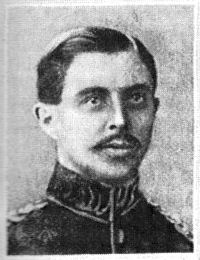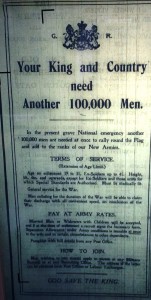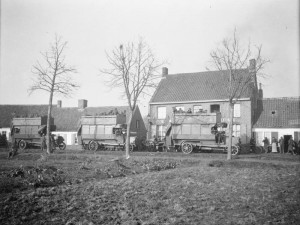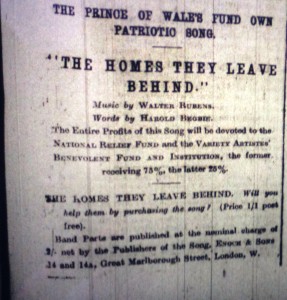On November 9th at the Victoria Arms, Fenny Compton. To Mr and Mrs G. K. Hancox, a daughter.
Monthly Archives: November 2014
Newsflash!
Third Austro-Hungarian invasion of Serbia
William Hugh Holbech, Deceased
All persons having any claims or demands against the estate of William Hugh Holbech, Esquire, late of Farnborough Hall, near Banbury, deceased, are requested to send full particulars thereof in writing to
Messrs H. & C. Collins
of 172, Friars Street, Reading, Berks
Solicitors for the Executors.
Your King and Country Need Another 100,000 Men!
Royal Warwickshires Transported to Ypres
Impressive Funeral Service at Farnborough
The whole neighbourhood has, we are sure, shared the great sorry which has fallen on the Holbech family in the death from wounds received on active service on October 25th, of Lieutenant William Henry Holbech, of the 2nd Scots Guards, which took place on Sunday in Woolwich Military Hospital. Lieutenant Holbech rejoined his old regiment at the outbreak of the war, and was wounded in one of the engagements on the Yser. He sustained a serious wound in the thigh, and it was some time before he could be surgically attended, and he died from septic poisoning. The news was conveyed to Farnborough on Sunday evening, just as the congregation had dispersed from church, the Vicar being informed by a messenger from Banbury, and Mr Cartwright conveyed the intelligence to the parishioners, by whom it was received with profound regret. The bell of the church was tolled. The family were in London.
Lieutenant Holbech was the eldest son of the late Lieutenant-Colonel Walter Holbech, of the King’s Royal Rifles, a member of the Honourable Royal Body Guard, who died on March 6th 1901, at the age of fifty-one, and grandson of Archdeacon Holbech, who died a fortnight later. A window near the font in Farnborough Church was put in to commemorate the late Colonel Holbech going to the Egyptian Campaign in 1882, and to celebrate the birth of his eldest son (Lieutenant Holbech) during the time the Colonel was on active service. The greatest sympathy has gone out to Mrs Holbech and the members of her family in their bereavement. Lieutenant Holbech was the leading representative of one of the oldest Warwickshire families, a family who have been associated with Banbury and the neighbourhood for many generations, and a family, too, who had always maintained the best traditions connected with the responsibilities of landed proprietorship. Lieutenant Holbech was unmarried and the entailment will go to his brother, Mr R. H. A. Holbech. Lieutenant Holbech took a keen interest in all matters which concerned the neighbourhood. He was a keen sportsman, a good cricketer, often playing with the Farnborough eleven. He was a good soldier and greatly esteemed in his regiment.

The funeral took place yesterday (Wednesday), at Farnboroough, at 2.30, at which hour a memorial service was held at the Grosvenor Chapel, South Audley Street, London. The coffin arrived at Banbury Station from Woolwich at 12.48, and as the funeral cortege passed through the town business was partially suspended, and most of the inhabitant en route had drawn their blinds, whilst flags floated half-mast from many of the buildings, and the Parish Church bell was tolled. On arriving at Farnborough the body was taken to the Grange, the present home of the Holbech family. The whole village was in mourning, and the bells rang out a muffled peal as the large congregation assembled. The officiating clergy, the Rev. Theodore Cartwright, Vicar of Farnborough, and the Rev. R. H. Purdue, Vicar of Mollington, and the choir, preceded by the cross-bearer, left the church to receive the body at the gate, and the Vicar read the opening sentences of the Burial Office, and as the coffin was borne to the foot of the chancel, Mr W. H. Jones, the organist, played ‘Blest are the Departed,’ from Spohr’s ‘Last Judgement.’ The coffin was covered with a large Union Jack, surmounted by a beautiful cross of white blooms, the bearskin and the sword of the deceased officer. The inscription on the plate was:
LIEUTENANT WILLIAM HENRY HOLBECH
2nd Scots Guards,
Killed in Action 1st of November, 1914.
Aged 32 years.
The chief mourners were Mrs Holbech, Mr R. H. A. Holbech, Miss Holbech, Miss Marjorie Holbech, Dr R. S. and Mrs Law, Lord Waleran, Rev. Canon Hugh Holbech, Mr A. Walrond, Mrs Herbert Benyon, Mr Gerald Hardy, and Mr H. Jordan (Reading). Amongst the large congregation present were Lord North, Lord and Lady Willoughby de Broke, Lady Stonhouse, Mr and Mrs Joshua Fielden, Colonel Basil Hanbury, Hon. Mabel Verney, Hon. Mrs J. P. Heywood Lonsdale, Misses Loveday, Mrs Pochin, Rev. C. Knightley, Mr and Mrs Waldron, Captain Holden, Rev. W. D. and Mrs Cartwright (Aynho), Mr and the Hon. Mrs Hope Brooke, Mrs Aubrey Cartwright, Mr J. Herbert Prater, Miss Perry, Mr and Mrs W I Shaw, Mr W. J. Weld, Mr G. Norris, Miss Prater, Mr R. H. Barnett, Mr C. C. Church, Mrs Cecil Boyle, Rev. M. Maltby (Cropredy), Mrs and Miss Willocks, Rev. S. R. Standage (Bourton), Rev. A. Hemstead R. D. (Shuckburgh), Mr W. Grazebrook, Rev. J. R. Brown (Fenny Compton), Mrs Pemberton, Dr Thorne, Dr Prichard, Mrs Paul, Mr P. C. Puckle, Mr T. S. Chappell, Mr H. M. Joynson, Major Maul, Dr Bossie, Mr Anker Symons (Henley on Thames), Dr Elkington, Mr W. J. Boshier, Mr H. Strange, Mr C. W. T. Drake (late agent), Squadron Sergeant Major Thomas, Mrs T. H. Curtis, Mrs Johnson, and other residents and neighbours. The following tenants on the Farnborough estate were present: Mr A. F. Boddington, Mr A. Page, Mr J. Craddock, Mr T. Gregory, Mr W, Horne, Mr A. H. Boddington, Mr W. H. Wadland, Mr Hanbury, Mr R. H. Roberts, Mr W. Boddington, Mr A. Wadland, Mr Burnham, Mr Smith, Mr J. Nicholls, and Mr S. Nicholls. There was also a large number of the villagers. Mr C. W. Griffin and Mr S. Nicholls, the churchwardens, had charge of the seating arrangements. The bearers were Messrs Youens, Horner, Page, Cooknell, Howes, J. Horner, and Eden, workmen on the estate, and the rest of the workmen followed. The opening hymn, ‘Let Saints on Earth in Concert Sing,’ was impressively rendered, as also was the Psalm, ‘I will take heed to my ways.’ The Rev. R. H. Purdue read the appointed lesson, and the Rev. Theodore Cartwright, the prayers. Then followed the hymn, ‘Soldiers who are Christ’s below,’ and Mr Jones played the ‘Dead March’ in ‘Saul’. This concluded the service in church, and the coffin was then borne to the grave, situated next to the late Colonel Holbech’s grave, in the corner on the south of the tower. The Rev. Theodore Cartwright read the beautiful committal prayers, and the service concluded with the singing of the first and last verses of ‘Onward Christian Soldiers.’ The grave was lined with evergreens and white flowers from the Grange garden.

There were some very beautiful floral tributes. In addition to the handsome cross on the coffin was a cross of violets standing against the wall of the church at the foot of the grave, bearing the inscription:
Thanking God for the most loving and truest of sons and brothers from Mother, Sybil, Olive and Marjorie
Mr R. H. A. Holbech’s tribute bore the words:
Ronnie in loving remembrance of a dear, kind brother
The following also sent tributes: The Grand Duke Michael of Russia, Countess Zia Torby, Countess Nada Torby, ‘With love from Violet,’ ‘Nancy, Arthur and Marion,’ Viscount and Viscountess Southwell, ‘Willie and Aunt Nellie,’ Lord and Lady North, Lady de Trafford, Lord and Lady Willoughby de Broke, Lady Watson, Emily, Lady ffolkes, Lady Hesketh, Lady Stonhouse, Hon. Mabel Verney, Sir Reginald Hardy and family, Lady Acland, Sir Samuel and Lady Scott, Mr C. T. Garland, Mr G. Game, Hon Mrs Barclay and Miss Barclay, the warrant officer, non-commissioned officers of the Scots Guards, the band of the Scots Guards, Mr Crawford Wood, parishioners of Farnborough, the Banbury Detachment of the National Reserves, Miss Prater, Rev. W. D. and Mrs Cartwright, Ethel Rawnsley, Miss Violet de Trafford, Mr and Mrs J. Fielden, Mr and Mrs J. Herbert Prater, Mr and Mrs Guy Hargreaves, Mrs Bouch, Mrs Frank Gaskell and family, Mr and Mrs Waldron, the Farnborough estate cottage tenants, the Grange servants, Mr S. Nicholls, Mrs Sheridan, Mr and Mrs W Grazebrook, Miss G Grazebrook, Mrs Severne and family, the family of the late Mr W Boshier, Mr and Mrs J. H. Blacklock, Evie Bruce, Mr and Mrs A. Motion, Mr and Mrs Rupert Butler, Mr George Henderson, Miss Perry, Daisy Chamberlain, the children of Mollington School, ‘From all at Engleton,’ Mr Gerald H. Deane, Mr and Mrs R. H. Barnett, Mr Cecil Gwyer and E. Roneth, Mr and Mrs A. Smith, Rev. and Mrs F. Symes Thompson, Mr and Mrs Fenton, Mr and Mrs W. Jones, Constance M. Butler, Banbury Early Closers’ Athletic Club, Mr and Mrs Henderson, Mr and Mrs Walker and others, some not having cards attached.
The funeral arrangements were carried out by Mr T. A Page of the White Lion Hotel and Mr George Gascoigne of North Bar.
The Rev. A. J. Jones, Vicar of Banbury, was prevented from being present by a parochial engagement.
By the death of Mr Holbech, the war has struck one of the oldest of our territorial families. The first record of the family is about the year 1260 and about two hundred years later they appear as large landowners in Warwickshire. The head of the Farnborough line may be said to be one Ambrose Holbech, a famous barrister of the seventeenth century, who married Joan, co-heiress of Thomas Holloway of Cropredy, and purchased the Manor of Mollington. In 1662 he was succeeded by his son, also Ambrose, who purchased Farnborough from the Raleigh family, who had been there for thirteen generations. Since then, the family have held Farnborough and Mollington, and also until 1868, when it was purchased by Merton College, Radstone, in Northamptonshire, which had been acquired by the same ancestor who bought Farnborough. In 1725 Anne, fourth daughter of William Hobech, married Tobias Chauncey of Edgcote, at that time Recorder of Banbury, and thus two leading families of the neighbourhood became united. The lady’s nephew, also William Holbech of Farnborough, brought the Borough of Banbury into further official connection with the family by becoming its Member of Parliament in 1794, and he represented it until 1796, when he gave way to Dudley North. In the same year he was returned for Banbury, he was High Sheriff of Warwickshire. To him succeeded his son, also William, in 1812, and four years later he also served as High Sheriff. This was the famous ‘Squire of Farnborough,’ who has been described as ‘one of the very last of the old country squires’ for before his death in 1856, at the age of 84, he had seen the old order change, but the generation just passed had memories of him in the blue coat with brass buttons, buff waistcoat and breeches and boots, which he wore to the end of his days. One of the best known members of the Warwickshire Hunt, he was for more than forty years, a regular rider to hounds and generally distinguished himself in the finest runs. He had the happiness of being the only one to live with hounds besides the huntsman and whips, when, one frosty morning in February 1817, they ran from his house at Farnborough and finished with a kill in the evening twilight near Moreton-in-Marsh, on a twenty mile point. In 1856 he was succeeded by his second son, Canon Charles William Holbech, who in 1873 became Archdeacon of Coventry, and the authors of ‘The Annals of the Warwickshire Hunt’ declare that the hunt had ‘no truer friend than Archdeacon Holbech, the most brilliant of horsemen, and the most ardent lover of that sport which, from conscientious motives as a clergyman, he never suffered himself to partake in. How great has been this self-denial no one perhaps but himself knew. As long as foxhunting continues, the traditions of the house will ensure that Harbage’s, Mollington Wood and Page’s Gorse will always hold a fox.’ The interest which the Archdeacon took in local affairs will be well remembered and his support of all efforts tending to the advancement of his neighbours in the town of Banbury could always be relied on. His eldest son, Colonel Walter Henry Holbech, of the King’s Royal Rifles, who served with distinction in the Red River Expedition in 1870 and the Egyptian campaign of 1882, predeceased his father by a fortnight in March, 1901, and on the Archdeacon’s death, the estate passed to Mr William Henry Holbech, the Colonel’s eldest son, who is now succeeded by his brother, Mr. Ronald H. A. Holbech.
The Horton Infirmary
The matron acknowledges the following gifts with thanks:- Fruit, vegetables and flowers from Adderbury, Shotteswell, Chacombe, Wigginton, Hanwell and Claydon harvest festivals.
Patriotic Song
The Homes They Leave Behind
Newsflash!
British attack on Tanga, East Africa


